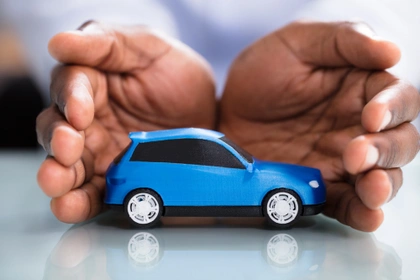1. Shop around for the best deals
It pays to research alternative providers before renewing your car insurance. Just because your current provider was the cheapest when you took out the policy, it doesn't mean that's still the case now.
You can use price comparison sites to get quotes from multiple retailers at once, but be sure to check with insurers directly too, as not all will appear. You may also get better deals from the same insurer via different sources.
2. Pay annually
If you can afford to, try and pay for your insurance annually. Paying monthly means you’re taking out a form of credit, so you'll be charged interest on top of the full balance - the higher your car insurance premium, the more interest you'll pay.
With an annual policy, you’ll pay for the year upfront without any interest. It may seem an extra-large expense to pay for in one go, but it could reduce the cost of your insurance overall.
Have you got savings that could fund it? Chances are the APR you pay on the insurance - which can be as high as 40% - could exceed what you earn in interest on savings. Also, paying on a 0% or low-interest credit card could be cheaper. Just remember to clear the balance before the introductory offer ends.
3. Keep your credit score healthy
If you are looking to pay monthly, your credit score can impact the cost. This is because the insurance company is likely to run a hard credit check when you apply. They want to see how risky it’d be for them to finance your insurance over the year. If they carry out a credit check and find you have a bad credit score, they may put your premium up.
4. Choose your car carefully
The make and model of your car are two factors that have a huge impact on the cost of your insurance. If you're buying a new one, be sure to check its insurance group first if you want to save yourself money and buy a car you can afford to insure.
The cost of insurance is based on a rating system from one to 50, with one the cheapest and 50 the most expensive. This classification is based on several factors, such as the vehicle's value, performance, safety, security and damage cost.
Taking these factors into account, the insurer will be calculating the:
- cost of replacing your car
- likelihood of you being involved in a collision
Avoid modified cars if possible, because it's more expensive for an insurer to repair in the event of an accident. The alterations that usually result in the most significant premium increases include:
- fitting a more powerful engine
- bodywork alterations
- transmission adjustments
5. Think about protecting your no-claims bonus
A long no-claims bonus can cut a huge chunk off your insurance premium, as it shows you’re a responsible driver, with less risk of making a claim. That's why it's a good idea to protect your no-claims bonus. Many policies offer the option for you to pay a little extra to do so, even if you do end up claiming.
While this protection increases your premium, it could still be a lot cheaper than losing your no-claims bonus discount. Bear in mind it’s designed "to cushion the hike that an insurer might apply" rather than guarantee the same discount after a claim.
Also, when comparing insurers, be aware that the highest no-claims discount doesn't always mean the cheapest deal overall. Individual insurers may offer a substantial discount but a costlier premium, so always check the total price.
6. Pick the right cover type
There are many different types of car insurance, with the most basic usually the cheapest. If you've got a low-value car, a third-party, fire and theft policy might be a better choice than a comprehensive cover. Make sure, though, that you are covered for everything you need.
Do you need all the features on your policy? Extras that aren't necessary for everyone include courtesy cars, breakdown cover and audio system cover. Check what comes with each policy, and see if you can get a reduction by removing them. It may also be cheaper to pay for the extras on top, rather than include them as part of your premium.
7. Consider who else goes on your policy
Adding extra drivers to your policy can influence the price of your premium. If they have a better driving history, it could lower the cost. Insurers may determine this if they have a licence for longer, are older than you or have a longer no-claims bonus, for example.
For the same reasons, if they are perceived to be a riskier driver than you, then it could mean a significant increase. This is particularly relevant if you’re looking to insure your children who have recently learned to drive, for instance. Shop around if you are considering this, as some providers will be more understanding than others with their pricing.
8. Increase your voluntary excess
Voluntary excess is the amount you're prepared to pay towards the cost of an accident. If you increase this figure, you'll lower your insurance premium. Make sure you remember to factor in the compulsory excess set by your insurer.
We don't recommend bumping up your voluntary excess too high, especially if you have a low-value car. If you do have an accident, it will mean you pay more towards the cost. So play around with different figures and see what impact it has on your premium.
9. Keep your mileage as low as possible
The less you drive your car, the less likely you are to have an accident, so this could reduce your premium. Can you use the car less? Or did you use it less than last year? Dropping your mileage by 1000-2000 miles a year or doing 40 miles a week less, could mean a cheaper premium.
Also, think about how you will use your car. Do you need it to commute? If not, changing the usage with your insurer can result in a lower premium. However, it's essential to calculate your annual mileage accurately, as well as being honest about what you use the car for. Failing to do so could invalidate your insurance.
10. Park your car in a safe place and increase the security features
Pick somewhere safe to park your car, and your payments should drop. Locked garages or a driveway are better options than on the side of a road or leaving it at work. This will reduce the risk of it getting damaged or stolen - positive steps your insurer should reward you for taking.
Another way to reduce the risk is by ensuring your car is secure – and thus harder to steal. Most modern models will have alarms and immobilisers fitted as standard, so make sure to mention them on your insurance quote. If you have an older car, double-check the features and think about adding them on. The cost of doing so might deliver a cheaper premium, as well as making it less likely to be stolen.
11. Get a black box
Also known as a ‘telematics box’, a black box monitors your driving style and performance. It can make your premium cheaper if you agree to have one installed, particularly if you are a young or inexperienced driver.
This information collected is then sent back to your insurer. From this, they'll decide what type of driver you are – and this could affect your insurance premium either positively or negatively. Things that can increase the price include:
- Braking sharply
- Speeding
- Late-night driving
- High mileage
It will differ from insurer to insurer, but many will provide regular feedback to encourage you to drive safer. It's in both of your interests to have a premium as low as possible, so drive as safely as you can, and you'll be rewarded with cheaper insurance.
Take an advanced motoring course
Pass Plus is an advanced driving course, which teaches you certain things your initial driving lessons won’t have covered. The training includes how to drive safely at night, including on motorways and in all weathers. Although it can be taken at any time, it's most useful to drivers who have passed their test within a year.
Although many insurers these days don't offer a discount for drivers who’ve taken the course, a few do, and it could make things cheaper. It may also help you be safer on the roads, which could help drop your premium if you’re using a black box.
Compare cheap car insurance quotes
- Search over 100 providers
- Quick and easy comparison tool
Disclaimer: We make every effort to ensure content is correct when published. Information on this website doesn't constitute financial advice, and we aren't responsible for the content of any external sites.




